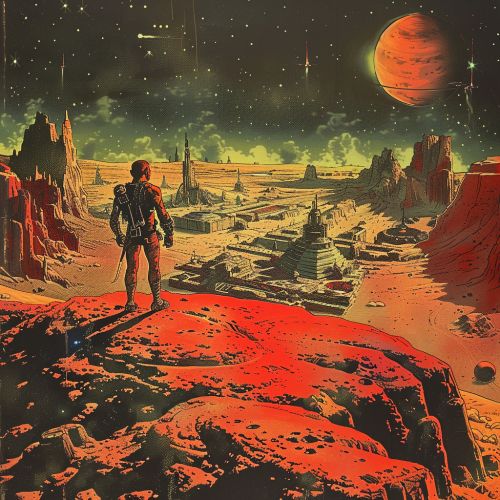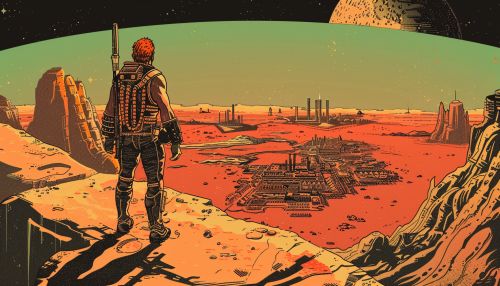John Carter of Mars
Introduction
John Carter of Mars is a fictional character and the protagonist of a series of science fiction novels written by Edgar Rice Burroughs. The series is often referred to as the Barsoom series, named after the Martian word for Mars. The character first appeared in Burroughs' novel "A Princess of Mars," which was serialized in 1912 and later published as a book in 1917. John Carter's adventures on Mars have been a significant influence on the science fiction genre, inspiring numerous adaptations and imitations.
Background and Creation
Edgar Rice Burroughs created John Carter at a time when science fiction was still in its infancy. The character and the world of Barsoom were influenced by the scientific and cultural milieu of the early 20th century, including the fascination with Mars as a potential site for extraterrestrial life. Burroughs' depiction of Mars drew on contemporary astronomical theories, such as those proposed by Percival Lowell, who speculated about the existence of canals on Mars.
Character Overview
John Carter is described as a Confederate veteran of the American Civil War who is mysteriously transported to Mars. He possesses extraordinary physical abilities due to the lower gravity of Mars, which allows him to perform feats of strength and agility that are impossible on Earth. Carter's character is defined by his unwavering sense of honor, bravery, and loyalty, traits that endear him to the various Martian races he encounters.
Plot Summaries
A Princess of Mars
In "A Princess of Mars," John Carter is transported to Mars, where he encounters the Tharks, a race of green-skinned, four-armed giants. He becomes embroiled in the political intrigues of the Martian city-states, particularly the conflict between the city of Helium and its enemies. Carter falls in love with Dejah Thoris, the princess of Helium, and his efforts to rescue her drive much of the plot.
The Gods of Mars
In the sequel, "The Gods of Mars," Carter returns to Mars after a ten-year absence and discovers that his beloved Dejah Thoris is imprisoned in the Temple of the Sun. The novel explores the religious and social structures of Barsoom, including the false gods worshipped by the Martians and the oppressive priesthood that enforces their rule.
The Warlord of Mars
"The Warlord of Mars" continues the story of Carter's quest to rescue Dejah Thoris. He confronts various adversaries, including the nefarious Therns and the treacherous First Born. The novel culminates in a climactic battle that solidifies Carter's status as a hero and leader on Mars.
Themes and Analysis
The John Carter series explores themes such as honor, loyalty, and the clash of civilizations. Burroughs' portrayal of Mars reflects contemporary anxieties about imperialism and cultural conflict, as well as a fascination with the possibilities of space exploration. The series also delves into the nature of heroism, with Carter embodying the ideal of the noble warrior.
Influence and Legacy
The John Carter series has had a lasting impact on the science fiction genre, influencing writers such as Ray Bradbury, Arthur C. Clarke, and Robert A. Heinlein. The character and his adventures have been adapted into various media, including comic books, radio dramas, and a 2012 film directed by Andrew Stanton.
Adaptations
Comic Books
John Carter's adventures have been adapted into numerous comic book series, beginning with a 1939 adaptation by John Coleman Burroughs, the author's son. Subsequent adaptations have been produced by publishers such as DC Comics, Marvel Comics, and Dynamite Entertainment.
Film and Television
The most notable film adaptation is the 2012 movie "John Carter," directed by Andrew Stanton and produced by Walt Disney Pictures. Despite its high production values and faithful adherence to the source material, the film was a commercial disappointment. There have also been various attempts to adapt the series for television, though none have been as successful as the original novels.
Scientific and Cultural Impact
The depiction of Mars in the John Carter series has contributed to the popular image of the planet as a world teeming with life and adventure. While modern science has debunked many of the theories that inspired Burroughs, the series remains a touchstone for discussions about the cultural and imaginative significance of Mars.
See Also
- Edgar Rice Burroughs
- Barsoom
- A Princess of Mars
- Percival Lowell
- Ray Bradbury
- Arthur C. Clarke
- Robert A. Heinlein
- Marvel Comics
- DC Comics
- Dynamite Entertainment
- Walt Disney Pictures


